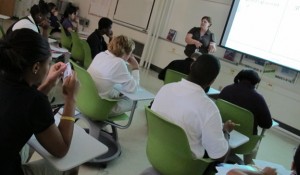Why Special Education Advocates Are On Edge Over New Teacher Licensing Rules
Becoming a teacher is no longer a matter of earning an education degree. College graduates are taking more alternative tracks into teaching that don’t involve going back to school for another four years.
But some colleges of education worry a change to Indiana’s teacher licensing rules could make it too easy to earn credentials to teach special education students.
Special education advocates are worried that college graduates without proper training could end up teaching in special education classrooms. But alternative certification advocates say training doesn’t necessarily make the teacher.
- Does The Degree Make The Teacher?Some colleges of education worry a change to Indiana’s teacher licensing rules could make it too easy to earn credentials to teach special education students. StateImpact Indiana’s Kyle Stokes asked whether teachers need teaching degrees to be effective.Download
Indiana’s State Board of Education will likely consider the amendments to the state’s teacher licensing regulations this fall.
But special education advocates at school of education across the state say the new rules open up a pathway for a college graduate without formal training to become a teacher, so long as he or she can pass a certification exam.
—Kharon Grimmet, IU School of Education
The pathway doesn’t lead to a full teaching license. But — so long as the teacher can earn “effective” ratings from their school district for three out of five years — special education advocates say he or she could keep a teaching job while holding a credential called an “adjunct permit.”
That’s of special concern to Kharon Grimmet, a former special education teacher, now an associate instructor at Indiana University’s School of Education. She says that bar is too low for those wanting to enter the profession.
“If you really want to be a teacher, let’s do it right,” Grimmet says. “Come and learn and get training and allow us to guide you.”
But Arthur McKee, managing director of teacher preparation studies at the National Council on Teacher Quality, says it’s not clear that training makes for more effective teachers. McKee says formal education school instruction doesn’t necessarily make teachers more effective, or help their students learn.
“We can’t justify raising the bar too high simply to keep people out, simply because we want to pat ourselves on the back and say ‘Oh, we’ve done something to help kids.’ Well, not necessarily,” McKee tells StateImpact. “If we’re asking people to learn things that aren’t effective, then we’re not helping anybody.”
So long as you have a system to support new teachers, McKee says, those teachers don’t need degrees in education to be effective. He adds teachers should be able to pass an exam on the science of reading in order to get certified.
Indiana’s new teacher licensing requirements tie into a new evaluation system for teachers. Starting next year, state law requires Indiana districts to rate teachers’ effectiveness on a four-point scale.
Indiana Department of Education spokesperson Stephanie Sample says the state’s universities haven’t put enough focus on preparing prospective teachers to perform under that system.
“We just have a lot more data that we didn’t have before, we have more tools to use to help students learn and make teachers better. And we want our Schools of Ed to start using those tools,” Sample says.
Judgment Calls
Teacher Cindi Pastore, who’s taught for 33 years in the Adams-Wells Special Services Cooperative, says she draws on her formal training daily to help her guide students’ growth — from finding ways to communicate with non-verbal students with autism to working with students with severe physical handicaps.
For instance, on one Monday afternoon, Pastore is working on a state evaluation for a student in a Life Skills course. The student is not on a track to earn a high school diploma, but instead earn a Certificate of Completion.
Pastore works with Adams Central Junior-Senior High teacher Deanna Myers, who sees the student on a daily basis. Sitting at Myers’ computer, Pastore logs onto a state website as boxes pop up on the screen. Together, Pastore and Myers have to check the proper box, indicating the degree to which this student measures up to state standards.
The distinctions they have to make can be tough. For example, Pastore and Myers have to determine whether the student is a “fluent” in a mathematical concept — like counting — or “demonstrates understanding of” that concept.
—Arthur McKee, National Council on Teacher Quality
Another example: A box on the screen asks Pastore and Myers whether the student can tell time on an analog clock. Yes, they conclude. What about to every five-minute interval? Yes. What about to the minute?
“I’m guessing that’s not where he is at,” Pastore concludes.
“Yeah, I agree,” Myers adds.
Knowing which box to check is a judgment call. Pastore says she relies on her training to help her make it, especially with special education students.
“There’s a whole range of things that come into play when you’re planning for a student that a person just coming in off the street would not necessarily take the time to know,” Pastore says. “They would just go in and say, ‘Oh, yay, I’ve got this kid making progress!’ You’ve got to know what you’re making progress towards.”
IU instructor Kharon Grimmet says the training these teachers have gotten to make these calls is important. She bristles at the idea that an education degree isn’t proper training for a teaching position — and says she feels like teachers aren’t given professional respect.
“People think we’re babysitters,” Grimmet says. “It’s one thing to stay with a student, or stay with a child, but it’s another thing to make an impact.”
If teachers need to be rated on their effectiveness, Grimmet says, they need training to know exactly what “effective” means.
Podcast: Play in new window | Download

